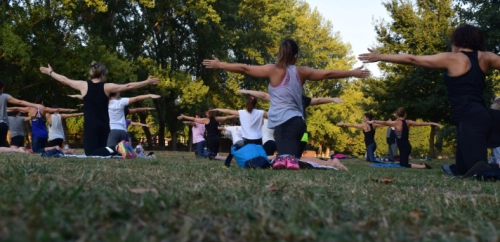How Can I Practice Self-Control? 5 Tips For Improvements

In order to get anything done, one definitely needs a certain level of self-control. But for some, that can be challenging and be quite frustrating in the end. But it doesn't have to be, because there are ways that one can improve or practice their self-control.
Though there is a multitude of different ways that one can really practice self-control, some of the best happen to encompass other mindfulness practices. Utilizing mindfulness techniques as well as meditation can be a great tool to build self-control. On top of that, making plans and understanding the consequences of not having self-control can also be a great tool to utilize.
That being said, understanding the how behind self-control needs to have a little bit more explanation when it comes to the why and what self-control actually is. So in this article, we're going to take a look at that as well as give you some pretty definitive tips on how you can improve your self-control.
Self-Control Defined
Self-control is known by a lot of different names. Some will use self-control while others will use willpower and even some use discipline, but they all amount to the same thing. Self-control is the capability of one to manage behaviors in order to steer clear of temptations so that they can reach their goals.
But that's not the only thing that comes along with a good self-control. When you have good self-control, you can delay any gratification and resist bad habits from being formed. Self-control is not limitless and must be cultivated and utilized when absolutely key.
Where it comes from is not really well known, though there are some studies that have insinuated that self-control is determined partially by genetics. But just like with everything else even if it does come slightly from genetics, your environment and society can also play a part in how good of self-control you actually have.
Why Is Self-Control Important?
The ability to control yourself in your day-to-day life is quite important. This is for a multitude of different reasons, but primarily because a lack of self-control will keep you from reaching any goals, whether they be personal or professional. This means, if you have better self-control, you will see more returns on your investments of time and energy. It can also play a part in your overall physical and mental health as well. For excess of anything is bad for you and your health.
Benefits of Self-Control
That being said, let's take a look at some of the benefits self-control can bring to you on a health level. In order to maintain healthy habits, you have to have self-control because as you all know we are inundated with temptations on a daily basis.
By learning how to practice better self-control, you see some of the following benefits:
-
Being able to control yourself when it comes to temptations, in particular when it comes to foods, can lead to a healthier diet and improved weight management.
-
Self-control is key in keeping away from the abuse of mind-altering substances, and this in turn will help keep you healthier.
-
On top of that, self-control can help you maintain healthy habits like exercising and mindfulness practices will help you maintain a good mental and physical health.
-
Professionally, self-control can help you by installing improved time management skills Which will allow you to excel in your position.
How Can I Practice Self-Control? Tips for Improvement
That being said, not everybody is gifted with a good self-control. But if you're someone who suffers from a lack of self-control, that doesn't mean that you're stuck with that level of capability for the rest of your life. In fact, there are many ways you can practice self-control in order to improve it. Just like with everything else the more you do it the better you're going to get and that means a world of change within your life.
Here are some of the best ways we think you can begin practicing self-control to see positive changes in your life:
Stay Away From Temptation
We all know what we are tempted by, but sometimes even though we know it, we can't stay away from it. So to build a level of self-control in relation to things that tempt us, we have to avoid them as best we can.
When you feel yourself being tempted to do something that you're trying not to do, find a different outlet. For instance, if you're trying to keep from smoking, maybe taking a walk or calling a friend could be a great distraction and allow you to have better self-control over that situation.
Make Plans
Understanding what could happen in certain situations can help you plan ahead to allow for improved self-control. Just like we're staying away from temptation, understanding what is going to be in front of us can help you dam up a wealth of self-control.
For instance, if you're going to a party, and you know there's going to be a lot of alcohol or sugary treats, maybe you fill yourself up on water or other things that can help you control these urges in order to allow your body to not have those cravings.
One Goal at a Time
When it comes to goal setting, a lot of us tend to go overboard when we're doing this. We will have multiple goals and make them quite large so that they seem insurmountable. When this happens, our self-control to follow through on things can be quite challenging because we feel like we're not moving towards anything or successful in the goals that we have put forth.
This will deplete our self-control, and that is a problem. So when looking at goals, focus on small goals that lead to the larger goal and always choose one goal at a time to help you maintain the most self-control you possibly can.
Meditate
Any type of mindfulness practice is a good idea. But meditation in and of itself is maybe by far the best option. Because of the focus on breathwork and stillness, it creates a sense of calm, which helps improve self-control.
On top of that, the process of meditation allows us to acknowledge our feelings that may be hindering our self-control and address them the way they need to be.
Understand the Consequences!
There are always consequences of any action we execute. But if it's something where we show a lack of self-control, you have to understand the consequences that are going to come from that. By not achieving these goals or building these habits, there will be adverse effects on our mental and physical health, as well as professional and personal lives. Once you understand the consequences, you may find that it's easier to maintain your self-control than it was before.
Final Thoughts
Self-control is important in all aspects of your life and has a huge impact on them. By learning how to practice self-control and improving your skills to do so, you'll be able to find your way to a happier, healthier life. By using some of the tips from above, we're sure that this skill will be honed properly. In other words, your wellness journey will be easier, and you'll find yourself building skills and habits that need you down the right path.















